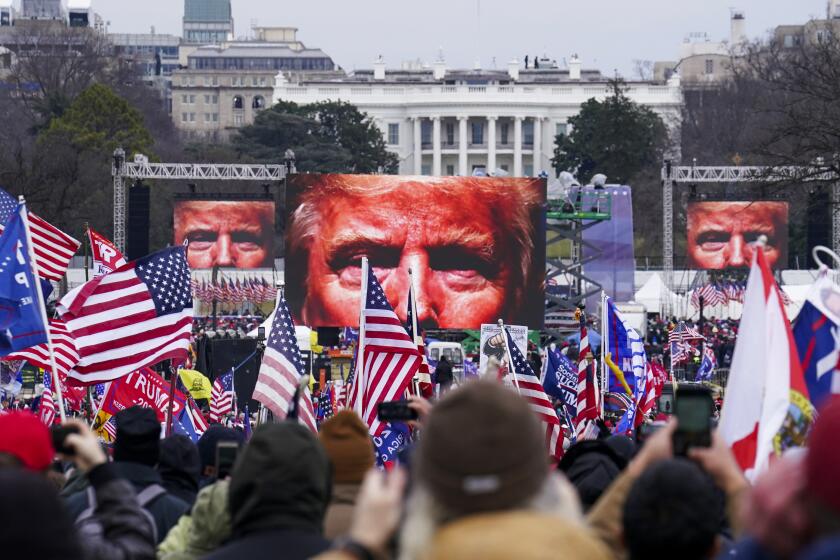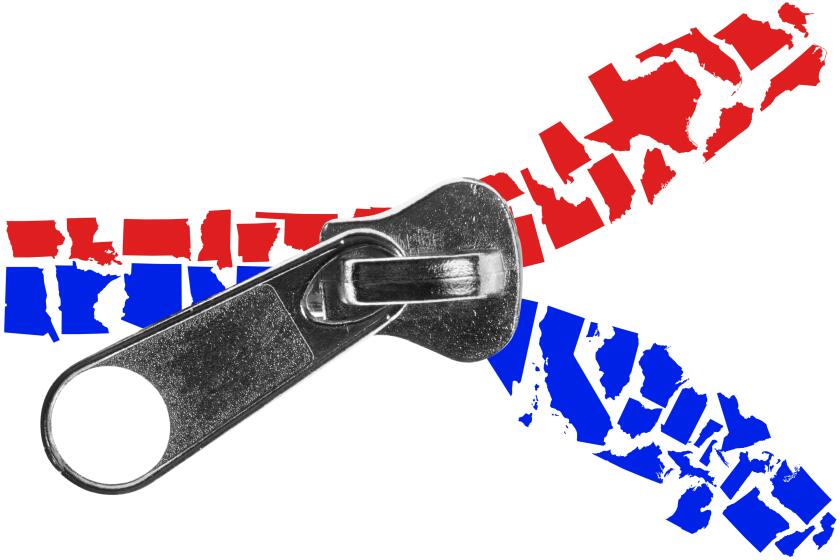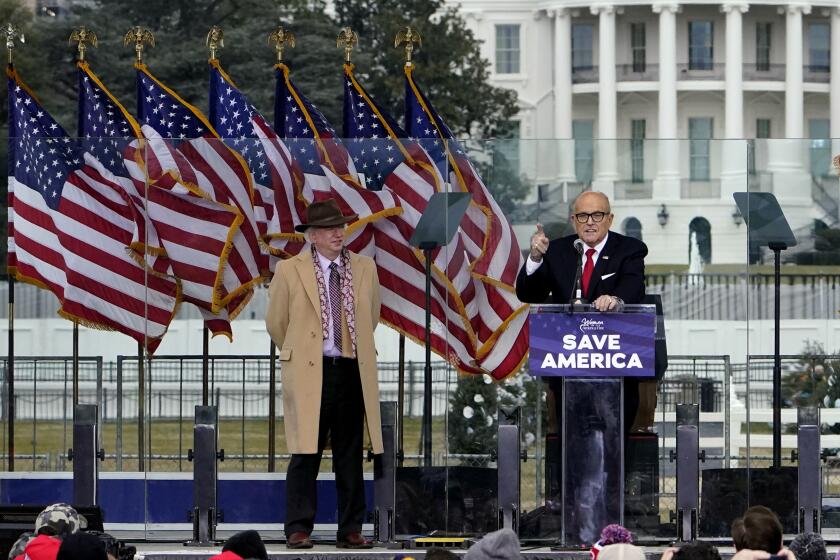Atty. Gen. Garland names special counsel to lead Trump-related probes

Veteran prosecutor Jack Smith will oversee Justice Department inquiries into classified documents at Trump’s estate and aspects of the Jan. 6 attack.
- Share via
WASHINGTON — Atty. Gen. Merrick Garland named a special counsel on Friday to oversee the Justice Department’s investigation into the presence of classified documents at former President Trump’s Florida estate as well as key aspects of a separate probe involving the Jan. 6, 2021, insurrection and efforts to undo the 2020 election.
The move creates a new chain of command over sensitive investigations seen as likely to accelerate now that the midterm elections have concluded.
The announcement of veteran prosecutor Jack Smith’s appointment just three days after Trump launched his 2024 presidential campaign is a recognition of the political implications of two investigations that involve not only a former president but also a current White House hopeful.
Garland cited Trump’s entry into the race and President Biden’s stated intention to seek reelection as reasons for Smith’s sudden appointment.
“The Department of Justice has long recognized that in certain extraordinary cases, it is in the public’s interest to appoint a special prosecutor to independently manage an investigation and prosecution,” Garland said from the agency’s headquarters.
Smith, who led the Justice Department’s public integrity section in Washington and was the acting chief federal prosecutor in Nashville during the Obama administration, is set to begin his work immediately, Garland said. Since 2018, Smith has served as chief prosecutor for the special court in The Hague that investigates international war crimes.
The Justice Department described Smith as a registered political independent, an effort to blunt any attack of perceived political bias. Trump is a Republican, and Biden is a Democrat.
“Throughout his career, Jack Smith has built a reputation as an impartial and determined prosecutor who leads teams with energy and focus to follow the facts wherever they lead,” Garland said. “As special counsel, he will exercise independent prosecutorial judgment to decide whether charges should be brought.”
“The extraordinary circumstances here demand it,” Garland said of the appointment.
GOP leaders were unusually blunt in the aftermath of the midterm election that they have a Trump problem. It may not be easy to convince the party base.
In a statement released by the agency, Smith said he intended to do his work independently and “in the best traditions of the Department of Justice.”
“The pace of the investigations will not pause or flag under my watch,” he vowed.
A Trump spokesperson responded to the appointment by calling it “a totally expected political stunt by a feckless, politicized, weaponized Biden Department of Justice.”
As special counsel, Smith inherits two ongoing probes involving Trump. One concerns potential interference in the transfer of power after the 2020 presidential election, when Trump allies scrambled for ways to overturn his loss to Biden, up to and including the storming of the Capitol on Jan 6, 2021. The other involves the retention of classified documents at Trump’s Mar-a-Lago estate in Palm Beach, Fla.
The Mar-a-Lago probe has escalated especially quickly, with prosecutors this month granting immunity to a close Trump ally to secure his testimony before a federal grand jury. Investigators in that case have interviewed a broad range of witnesses and, in court filings, have cited legal concerns over the presence of top-secret materials at Mar-a-Lago despite strict procedures for the handling of classified information. Investigators have also alleged that there have been efforts to obstruct that probe.
As special counsel, Smith will be empowered to decide whether to prosecute any crimes uncovered in the investigations. Though Garland will retain ultimate oversight of Smith’s work, the attorney general emphasized the independent decision-making that Smith will bring to the job.
The selection of someone from outside the agency to be special counsel was notable given how much emphasis Garland has placed on trying to ensure public confidence in his own staff of prosecutors after the tumultuous years of the Trump administration, and on reassuring Americans that his prosecutors’ decisions are based on facts, the evidence and the law and can therefore be trusted.
Divided government in Washington will push even more of the nation’s fiercest political fights to the states.
There does not seem to be an obvious conflict involving the agency, like the one that prompted the last appointment of a special counsel to handle Trump-related investigations.
In 2017, in a recognition of the inherent conflict of interest of investigating a president who controls the executive branch, the Trump Justice Department named former FBI Director Robert S. Mueller III as special counsel to lead the investigation into Russia’s potential coordination with Trump’s 2016 presidential campaign.
Mueller declined to make a decision on whether Trump had criminally obstructed justice, noting long-standing Justice Department policy against indicting a sitting president. As a former president, Trump will no longer have that protection.
The special counsel post is the latest in a series of prosecutorial jobs for Smith, who early in his career was an assistant district attorney in New York.
Lanny Breuer, who led the Justice Department’s criminal division when Smith ran the public integrity section, called him “an exquisite lawyer and an exquisite prosecutor.”
Even if Donald Trump is never indicted for his Jan. 6 actions, loyalists such as Roger Stone, Michael Flynn and Mark Meadows should be held to account.
“He’s not political at all,” Breuer said. “He’s straight down the middle.”
Smith grew up in upstate New York and graduated from Harvard Law. He told the Associated Press in 2010 that he saw the prosecutor’s job as serving people like his parents and others he grew up with in the town of Clay.
“They pay their taxes, follow the rules, and they expect their public officials to do the same,” he said.
Smith had returned to the Justice Department at the time to oversee its then-troubled public integrity section, which was battered publicly after failing to turn over exculpatory evidence in the criminal trial of former Alaska Sen. Ted Stevens, a Republican. Supporters praised Smith as apolitical and hardworking.
During his tenure, his unit brought a series of high-profile cases against elected officials from both major political parties. Not all were successful, and not all investigations resulted in criminal charges — a powerful lesson, Smith told the AP.
When there isn’t sufficient evidence to bring a case, “you have to be able to admit that ...if it’s not there, it’s not there,” he said.
“I think that’s hard for people to do, and having been a prosecutor for 15 years, that is something I can do.”
Associated Press writers Jill Colvin, Colleen Long, Zeke Miller and Nomaan Merchant contributed to this report.
More to Read
Get the L.A. Times Politics newsletter
Deeply reported insights into legislation, politics and policy from Sacramento, Washington and beyond. In your inbox twice per week.
You may occasionally receive promotional content from the Los Angeles Times.













